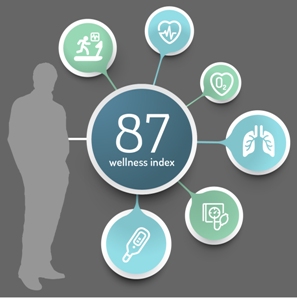Jul 25 2014
PhysIQ has announced the company launch based on its proprietary predictive analytic technology for human physiology. PhysIQ is the first patient-centered predictive analytics platform for both the regulated Healthcare and unregulated Health & Fitness markets.
 The PhysIQ technology platform detects subtle changes in health vitals for proactive health monitoring (Graphic: PhysIQ)
The PhysIQ technology platform detects subtle changes in health vitals for proactive health monitoring (Graphic: PhysIQ)
This novel platform is designed to reliably detect subtle changes in vital signs and other health indicators helpful to both clinicians in managing patients who are suffering from chronic illness, as well as consumers interested in tracking their own health and fitness levels. The PhysIQ platform constructs a personalized baseline norm for each person monitored, rather than simple trending or comparison to population-based statistics. It can also be embedded into patient monitoring devices from other manufacturers who are seeking to design “smarter” products.
“Many technology companies today are delivering health information through medical or consumer devices. However, they are all missing an essential step, which is giving the person monitored real-time health updates based on their own health background. The PhysIQ platform is different from all other analytical approaches currently being used in the emerging Digital Health space because it compares you to you, and not you to what might be normal for the broader population,” explains Gary Conkright, CEO, PhysIQ. “Our transformational predictive analytic technology is designed to bring new insights to physiology vital-sign monitoring for applications ranging from helping doctors to better understand their patients with chronic medical conditions to empowering the informed consumer to take greater control of their health.”
Proven through millions of hours in highly complex industrial applications
Formerly known as VGBio, PhysIQ founders previously worked to commercialize predictive analytic solutions originally developed at the Argonne National Laboratory to monitor complex, mission-critical machine applications, including commercial jet engines, oil and gas, and nuclear reactors. Predictive analytics has proven to be highly effective at reducing unplanned outages and minimizing operating and maintenance costs in these and other mission-critical applications. Boasting an extensive patent portfolio, the PhysIQ team now brings the same personalized analytics technology and commercialization expertise to monitor physiological changes in the human body.
“Today’s healthcare system is optimized for an acute, reactive care delivery model. Expensive and often scarce resources are mobilized to stabilize and attend to patient needs, and all too often these patients soon return to the hospital for another acute admission. This traditional model is inefficient and unsustainable. Innovations in remote monitoring devices, combined with data analytics technology from PhysIQ, will make it possible to provide higher quality, proactive care at a lower cost to the system,” states PhysIQ clinical advisor Dr. Steven Steinhubl, Scripps Translational Research Institute.
Enabling connective health across multiple platforms
The patented PhysIQ advanced personalized health data analytics platform is a device-agnostic platform designed to work with any wearable Digital Health device or other sensor-based physiology monitoring equipment. Recent announcements by major market leaders like Samsung, Apple and Google on plans to create new and less obtrusive, wearable devices make remote monitoring more practical than ever before. For example, it was recently showcased at the Samsung “Voice of the Body” announcement of SAMI (Samsung Architecture Multimodal Interactions), the company’s cloud-based data broker platform, demonstrating how the PhysIQ platform uses multiple streams of biometric data to create a numerical Wellness Index.
Today’s wireless networks, non-invasive sensors and ultra-low power consumption chips are now being combined to enable the continuous collection of physiological data from ambulatory patients and health conscious consumers alike. However, this will create a tsunami of data that can quickly overwhelm users and prove to be difficult to interpret.
The power of the PhysIQ platform is that it analyzes numerous data streams originating from any sensor or wearable device to gather key data about a patient’s physiology, including heart rate, blood pressure, oxygenation of the blood, respiration rate and many other biological signals. It then readily converts this physiological data into meaningful information that can be used by clinicians or consumers to make informed decisions and change behavior.
Turning human data into intelligent, actionable insights
“The challenge of remote monitoring is to identify subtle precursors against a backdrop of normal variation. PhysIQ provides exceptional insight by processing and synthesizing multiple data streams in real-time to create an individualized patient profile,” explains Dr. Martin Burke, University of Chicago Medical Center. “A holistic baseline profile makes it possible to pinpoint discreet changes that might otherwise go undetected, yet represent significant clinical departures from the patient’s normal baseline. This provides an invaluable diagnostic tool to help physicians improve patient quality of life and reduce the cost of care.”
Dr. Burke is overseeing clinical studies involving the PhysIQ platform. PhysIQ has conducted two clinical studies on heart failure patients at the University of Chicago Medical Center, and is preparing for a third study, while in the process of adding several new study sites. The PhysIQ platform is also the brains behind the company’s VitaLink remote patient monitoring product that recently completed a paid pilot study with the United States Department of Veteran Affairs. VitaLink uses an Android smartphone app to transmit vital signs in real-time to PhysIQ’s data center, where data is analyzed and made available for clinical use.
The company plans to submit a 510(k) to the FDA later this year. PhysIQ also recently closed on a $4.6 million Series A funding round led by the LionBird investment firm. The funds will be used to accelerate PhysIQ corporate growth via additional clinical studies and regulatory filings.